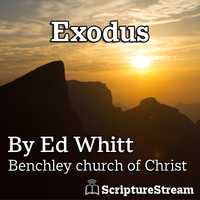Background on Exodus
- The promise
- First given to Abraham
- The covenant
- Given to Abraham = Genesis 17
- Permanent for his descendants
- Birthright passed to successors of subsequent generations: Isaac, Jacob (Israel)
- The generations
- Humble arrival in Egypt
- As a slave – sold by brothers
- Joseph’s ordeal
- Refuses Potiphar’s wife
- Jail time
- Joseph’s triumph
- Dreams
- Promotion
- Purpose
- Family joins
- Out of hunger
- Joseph “master” of food
- Revealed to his brothers and father
- Nation’s treatment
- Israel given Goshen, treated well
- Dating of Exodus
- Several dates speculated
- Exodus even denied by some
- Most accepted date – 1446 BC
- Support for the 1446 BC date
- Primary source is I Kings 6:1
- Solomon’s reign began about 970 BC
- 480 BC + 970 BC – 4 = 1446 BC
- Also, Acts 13:17-20
- Primary source is I Kings 6:1
Pharaohs of Exodus
- Consider the following:
- Psalms 83:3-4
- Proverbs 10:7
- God does not name Pharaoh
- Egypt would not name Israel
- Contrast of Pharaohs
- First Pharaoh (time of Moses’ birth)
- Thutmose I or Amenhotep I
- Both capable of issuing infanticide decree
- Pharaoh of the plagues
- Amenhotep II
- 7th Pharaoh of the 18th Dynasty
- His successor (Thutmose IV) not the “true heir” (not firstborn son)
- Firstborn would have died in tenth plague
- Amenhotep II
- Answer could be “D – None of the above”
- Consider Psalms 9:5-8
- Also Psalms 109:15
- It was normal for names and events to be blotted out
- Not flattering to Pharaoh
- Not convenient to his self-perceived glory
Who wrote Exodus?
- Exodus 17:14
- Numbers 33:2
- Exodus 24:4 (Exodus 20:21 – 23:33)
- Exodus 34:27 (Exodus 33:11 – 34:26)
- Familiarity with the ways and facts of Egypt – Acts 7:22
- Mark 12:26-27 (Exodus 3:6)
- Sounds like Moses is the author of Exodus
Was the Exodus real?
- Our faith says yes
- Many say no
- No direct archaeological evidence
- No direct writings
- Indirect evidence is there
- Circumstances
- Influx of Hyksos (Semites) some 400 years previous
- Buildings requiring intense labor
- Innumerable slaves working to build a treasure city
- Bricks with too little straw
- Records – not all the bad news was destroyed
- Hapi (god of Nile) making waters undrinkable
- Kermit (god of fertility) released frogs
- Osiris (corn) would not hold back locusts
- Ra (sun) refused to shine
- Pharaoh had no eldest son to succeed
- Circumstances
Why?
- Purpose of Exodus event
- What was the point?
- Goshen was nice
- God defeated Pharaoh
- Why not just stay
- What was the promise?
- Did it include a “where”?
- Could He have given them Egypt?
- What was the point?
- Remember the promise – Genesis 12:1-9
- Repeated Acts 7:2-5
Impact of Exodus
- God made Israel into a nation
- Laws
- Leadership
- Led them to a country
- Nations would fear the God of Israel
- Exodus 15:14 – “The peoples have heard, they tremble”
- Remember Rahab? Joshua 2:8-11
- Constant reminder of God’s lovingkindness toward Israel
- Much of Chapter 13 reminds Israel during the Passover
- Feast of Unleavened Bread – Exodus 23:15
- Joshua 24:6; Judges 2:1; I Samuel 12:8; I Chronicles 17:21
